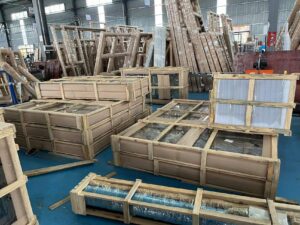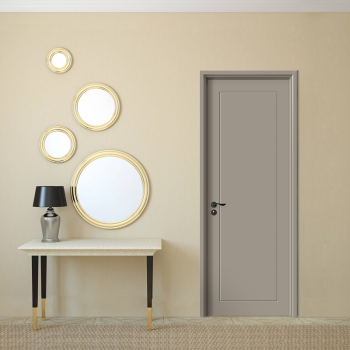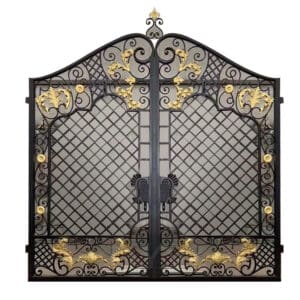
How to choose the right custom doors and windows for your project?
How to choose the right custom doors and windows for your project? Frustrated by energy leaks, poor operation, or mismatched styles? Selecting inappropriate fenestration costs
When it comes to choosing the right door for your home or commercial space, the decision often boils down to two popular options: steel doors and fibreglass doors. Both materials have distinct advantages and characteristics that make them suitable for different needs. Understanding their differences can help you make an informed choice.

Steel Doors: Steel doors are made from strong, durable steel sheets with a foam or wood core for insulation. The outer layer is often coated to resist corrosion and can be painted to match any aesthetic.
Fibreglass Doors: Fibreglass doors consist of a fibreglass skin over a core that may be made of foam or wood. The fibreglass surface is highly customizable, often mimicking the appearance of wood while offering greater durability.
Steel Doors: Steel doors are known for their exceptional strength and security. They are resistant to impacts and can withstand harsh weather conditions. However, they may dent or rust over time if not properly maintained.
Fibreglass Doors: Fibreglass doors are highly resistant to scratches, dents, and corrosion. They perform well in extreme weather conditions without warping or cracking, making them an excellent choice for long-term durability.
Steel Doors: Steel doors provide good insulation due to their foam cores, which help regulate indoor temperatures. However, they can be less energy-efficient if the seals around the door are not properly maintained.
Fibreglass Doors: Fibreglass doors are highly energy-efficient, as their construction prevents heat transfer effectively. They also typically include weather-resistant seals that enhance their insulating properties.
Steel Doors: While steel doors offer a sleek and modern look, their design options are somewhat limited. They’re often chosen for industrial or minimalist designs but can be painted to suit various preferences.
Fibreglass Doors: Fibreglass doors are versatile in appearance, offering a wide range of styles, colors, and textures. They can replicate the look of wood without the maintenance concerns, making them a popular choice for residential settings.
Steel Doors: Steel doors require periodic maintenance to prevent rust and corrosion, especially in humid or coastal environments. Dents may also need professional repairs.
Fibreglass Doors: Fibreglass doors require minimal maintenance. They are resistant to most environmental damage and only need occasional cleaning to maintain their appearance.
Steel Doors: Steel doors are generally more affordable upfront, making them an economical choice for budget-conscious buyers. However, potential maintenance and repair costs can add up over time.
Fibreglass Doors: Fibreglass doors have a higher initial cost, but their durability and low maintenance needs can make them more cost-effective in the long run.
Both steel and fibreglass doors offer unique benefits that cater to different priorities. If you value strength, security, and affordability, steel doors might be the ideal choice. On the other hand, if you prioritize aesthetics, energy efficiency, and low maintenance, fibreglass doors could be the better option. By evaluating your specific needs and budget, you can select the door that best suits your space and lifestyle.

How to choose the right custom doors and windows for your project? Frustrated by energy leaks, poor operation, or mismatched styles? Selecting inappropriate fenestration costs

How to choose a reliable custom doors and windows manufacturer? Spent months waiting for windows that don’t fit or doors that leak? Choosing the wrong

How do custom curtain wall systems improve building energy performance? Struggling with soaring energy bills from inefficient facades? Modern custom curtain walls can slash HVAC

What should you use instead of a curtain wall? Running into thermal or budget limitations with curtain walls? Modern alternatives now offer comparable aesthetics at

How to replace a door yourself? Tired of squeaky, drafty doors that stick? Replacing an interior door costs $50-$150 DIY versus $200-$500 hired out, and

How to get custom aluminum doors? Need sleek, durable entryways but overwhelmed by options? Custom aluminum doors range from $1,200-$8,000+ installed, with lead times of
Before contacting suppliers, it’s essential to determine the exact specifications of the windows and doors you need. This includes:
The more detailed you are, the easier it will be for suppliers to provide accurate quotes and product options.
China has a vast manufacturing industry, so it’s crucial to find reliable suppliers who can deliver quality products on time. Here’s how to start your search:
Consider factors like the supplier’s reputation, certifications, and product quality. It’s also wise to work with suppliers who are accustomed to exporting to your region, as they’ll be familiar with international standards and shipping requirements.
Before placing a large order, request samples. Samples give you a chance to assess the quality firsthand and confirm that it meets your standards. Be prepared to cover the costs of samples and shipping, but consider it an investment in ensuring you’re working with a trustworthy supplier.
When reviewing samples, pay attention to:
Once you’ve selected a supplier, it’s time to negotiate terms. Most suppliers expect some level of bargaining, especially for larger orders. Important aspects to discuss include:
Quality assurance is crucial, especially when importing from abroad. Consider these inspection steps:
Importing windows and doors involves managing shipping logistics and navigating customs procedures. Here are some key factors:
After confirming quality, shipping terms, and pricing, you can place your order. Ensure that:
When the products arrive, inspect them thoroughly. Ensure there’s no damage from transit, and verify that everything matches your specifications. If there are any issues, address them with the supplier immediately.